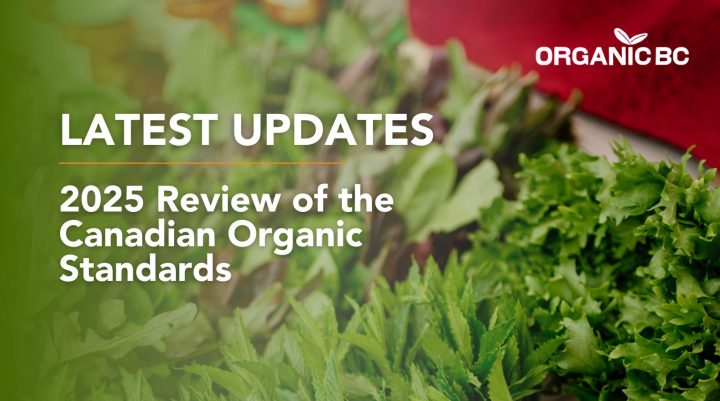The Canadian Organic Standards are reviewed and amended every five years to clarify any pieces that were causing confusion, to take into account submissions received from industry and organic stakeholders, to ensure standards compliance with Canada’s organic trading partners, and to ensure the standards remain up to date with the latest research and technologies.
Below are the latest updates and ways to take part in this important review!
October 2024
On September 16th, the Technical Committee met and reviewed multiple proposals from working groups. Some of these proposals were accepted, to be added to the draft standard which will be opened for public comment in 2025. Other proposals required further discussion and were returned to working groups to rework.
Next up: The Technical Committee will be meeting again in November, over three days in Ottawa during the Canada Organic Trade Association’s flagship event, the Organic Summit. There, they’ll review the majority of proposals in preparation of the draft Standards.
Nic Walser, our Accreditation Director, will be in attendance as Organic BC’s representative for this review. And, our Executive Director, Eva-Lena Lang, will be at the Summit to take part in the many inspiring presentations, engaging talks, and networking opportunities focused on the organic market and scientific insights.
New Public Comment Period
One of the best ways to get involved is to take part in a public comment period and help clarify the standards!
The latest public comment period includes these topics: heating temperature for the bottling of honey & ammonia water derived/extracted from a digester.
Feedback from conformity verification bodies, certifying bodies, operators and other organic stakeholders is encouraged. Deadline for comments is Oct. 11, 2024. Learn more here (PDF).
Animal welfare and biodiversity on the agenda of the standards’ review
In mid-September 2024, the Technical Committee on Organic Agriculture (TC) of the Canadian General Standards Board (CGSB) met to discuss proposed changes to the Canadian Organic Standards (COS).
During the five-hour online meeting, Working Group chairs presented various recommendations to improve the standards. The TC had three choices: to accept, reject or resubmit the recommendation to the Working Group (WG) if it needed clarification or background information. A draft containing all the recommended modifications to the standards will be made available for public review in the spring of 2025.
August 2024
Survey Results: Should the Canadian Organic Standards contain requirements for social justice?
“No!” was the overwhelming response from organic producers surveyed by the Organic Federation of Canada in July 2024.
Although farmers support the concept of social justice and want to see farm workers treated fairly, 80% of organic farmers surveyed said they were strongly opposed to adding such social justice requirements to the standards. Most farmers didn’t even want non-binding recommendations about social justice. Just discussing such changes led to vehement, often angry, responses to the survey.
July 2024
Should the Canadian Organic Standards contain requirements for social justice? Share your thoughts!
Although organic farming is based on the principles of health, ecology, care and fairness, the Canadian Organic Standards focus more on environmental impacts and animal welfare than the principle of fairness, which states “organic agriculture should build on relationships that ensure fairness with regard to the common environment and life opportunities.”
In the 2020 revision of the standards, the social fairness task force took a step towards incorporating the concept in the standards, adding a detailed description of social fairness (see Appendix C of the 2020 Standard).
Now, for the 2025 revision of the standards, the social justice task force has been considering whether or not to add social justice requirements that organic producers (farmers and processors) must meet to be certified organic.
The Organic Federation of Canada shared a great article (written by Janet Wallace) that digs into this topic, raises important questions, and outlines a proposed “meaningful but not scary” approach.
We invite you to give the article a read and then share your thoughts in the OFC’s Social Justice in the Organic Standards survey!
Read the article here, and take the survey here.
June 2024
The 2025 review of the Canadian Organic Standards is underway, and an easy way to get involved is to take part in a public comment period and help clarify the standards!
Here’s how it works:
- These public comment periods are hosted by the Standards Interpretation Committee (SIC), which was created by the Canadian Food Inspection Agency to help resolve conflicting interpretations of the standards between certification bodies and certified operators.
- The SIC compiles questions sent in by organic stakeholders, and adds their own proposed answers. Then, the SIC sends the document out for public feedback.
- A public comment period is happening right now until July 12th, and all organic stakeholders (including organic operators, certifying bodies and conformity verification bodies) are encouraged to participate!
Visit organicfederation.ca/organic-standards-interpretation and click on the Public Comment Period link to have your say!
April 2024
From the Organic Federation of Canada:
Work on the 2025 revision of the Canadian Organic Standards (COS) is progressing well. The working groups have worked through issues raised by the organic industry during the call for petitions in 2023. The result was 60 recommendations that are being presented to the voting members of the Canadian General Standards Board’s Technical Committee on OrganicAgriculture (TC). The first meeting of the TC was April 8.
These recommendations cover a wide range of practices: treated posts on organicfarmland, exercise periods for cows, calculation of the percentage of solid and liquid organic ingredients in prepared foods, guano as a permitted substance, biodiversity in maple groves, animal handling methods, and many more.
The Organic Federation of Canada (OFC) will publish a detailed account of the recommendations submitted and the decisions of the TC when complete.
Have you subscribed to the Info-Bio newsletter published by the Organic Federation of Canada? This is an excellent way to stay up-to-date on the COS review! Subscribe here.


